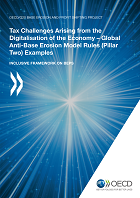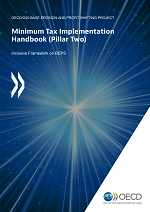Base erosion and profit shifting
Tax Challenges Arising from the Digitalisation of the Economy – Global Anti-Base Erosion Model Rules (Pillar Two)
Model GloBE Rules | Commentary | Administrative Guidance | GloBE Information Return | Safe Harbours and Penalty Relief | Examples | Implementation Handbook | Background material
A key part of the OECD/G20 BEPS Project is addressing the tax challenges arising from the digitalisation of the economy. In October 2021, over 135 jurisdictions joined a ground breaking plan to update key elements of the international tax system which is no longer fit for purpose in a globalised and digitalised economy. The Global Anti-Base Erosion Rules (GloBE) are a key component of this plan and ensure large multinational enterprise pay a minimum level of tax on the income arising in each of the jurisdictions where they operate. More specifically, the GloBE Rules provide for a co-ordinated system of taxation that imposes a top-up tax on profits arising in a jurisdiction whenever the effective tax rate, determined on a jurisdictional basis, is below the minimum rate.
Latest releases
- Administrative Guidance on the Global Anti-Base Erosion Model Rules, December 2023 (see more details)
- Minimum Tax Implementation Handbook
- GloBE Information Return (see more details)
 |
Published 20 December 2021
Access the report |
This report delineates the scope and sets out the operative provisions and definitions of the GloBE Rules. These rules are intended to be implemented as part of a common approach and to be brought into domestic legislation as from 2022.
Commentary to the GloBE Rules - first edition
 |
Published 14 March 2022
Access the report |
This Commentary explains the intended outcomes under the GloBE Rules and clarifies the meaning of certain terms. It also illustrates the application of the rules to certain fact patterns.
Agreed Administrative Guidance
 |
Published 18 December 2023
Access the report
|
This document sets out the third set of Administrative Guidance items released by the Inclusive Framework, following the first and second sets of Administrative Guidance items that were published in February 2023 and July 2023 respectively. This third set of guidance supplements the Commentary to the Global Anti-Base Erosion Model Rules in order to clarify their application, including guidance on the application of the Transitional Country-by-Country Reporting Safe Harbour and a mechanism for allocating taxes arising in a Blended Controlled Foreign Corporation (CFC) Tax Regime when some of the jurisdictions the MNE operates in are eligible for the safe harbour.
 |
Published 17 July 2023
Access the report |
This document sets out the second set of Administrative Guidance items released by the Inclusive Framework, following the first set of Administrative Guidance items that were published in February 2023. This second set includes guidance on currency conversion rules when performing GloBE calculations, on tax credits, and on the application of the Substance-based Income Exclusion (SBIE). It also includes further guidance on the design of Qualified Domestic Minimum Top-up Taxes (QDMTT) as well as two new safe harbours:
- A permanent safe harbour for jurisdictions that introduce a Qualified Domestic Minimum Top-up Tax (QDMTT), which will make compliance and administration easier for MNEs and tax administrations.
- A transitional safe harbour, which provides the UPE Jurisdiction with relief from the application of the UTPR for fiscal years commencing on or before the end of 2025.
 |
Published 2 February 2023
Access the report |
The items of Administrative Guidance set out in this document address a wide range of issues that Inclusive Framework members have identified as the issues most in need of immediate clarification and simplification for stakeholders. In particular, this document addresses issues related to the scope, the income and taxes calculation as well as issues related to insurance companies. It also provides guidance on the transition rules and the design of Qualified Domestic Minimum Top-up Taxes (QDMTT).
 |
Published 17 July 2023
Download the report (PDF)
|
The GloBE Information Return sets out a standardised information return to facilitate compliance with and administration of the GloBE Rules. It contains the information a tax administration needs to perform an appropriate risk assessment and to evaluate the correctness of a Constituent Entity’s Top-up Tax liability. This document has been developed following a public consultation that took place in March 2023. In response to feedback, the GIR incorporates transitional simplified reporting requirements that allow MNEs to report their GloBE calculations at a jurisdictional level. The GIR will be subject to coordinated filing and exchange mechanisms that allow MNEs to report their GloBE calculations on a single return, where the more detailed information is made available to implementing jurisdictions where a Top-up Tax liability may arise.
Safe Harbours and Penalty Relief
 |
Published 20 December 2022
Download the report (PDF)
|
Building on the input from a public consultation in April 2022, the Inclusive Framework has agreed on the design of a transitional safe harbour and a regulatory framework for the development of a potential permanent safe harbour as well as a common understanding for a transitional penalty relief regime.
 |
Published 14 March 2022
Download the report (PDF)
|
These examples illustrate the application of the Model GloBE Rules to certain fact patterns.
 |
Published 11 October 2023
Access the report |
This Implementation Handbook on the minimum tax provides an overview of the key provisions of the rules and the considerations to be taken into account by tax policy and administration officials and other stakeholders in assessing their implementation options. This Implementation Handbook was prepared under the Indian Presidency of the G20 and is not intended to modify the application or interpretation of any aspect of the Model Rules, the Commentary or the Agreed Administrative Guidance.
- Summary: Pillar Two Model Rules in a nutshell - Updated July 2023 (Coming soon: Français)
- Fact sheets (Coming soon: Français)
- Frequently asked questions - Updated July 2023 (Coming soon: Français)
Press releases
- 18/12/2023 - OECD/G20 Inclusive Framework releases new information on key aspects of the Two-Pillar Solution
- 17/07/2023 - OECD reports strong progress to G20 on international tax reforms
- 02/02/2023 - International tax reform: OECD releases technical guidance for implementation of the global minimum tax (Also available in: Français)
- 20/12/2022 - Further progress on two-pillar solution: OECD releases consultation document on the withdrawal of digital service taxes and other relevant similar measures under Pillar One and an implementation package for Pillar Two (Also available in: Français)
- 14/03/2022 - OECD releases detailed technical guidance on the Pillar Two model rules for 15% global minimum tax (Also available: Français)
- 20/12/2021 - OECD releases Pillar Two model rules for domestic implementation of 15% global minimum tax (Also available: Français | Deutsch | Español)
More information
- OECD work on BEPS
- Contact us via e-mail: CTP.Contact@oecd.org
- Follow us on social media: @OECDtax (X/Twitter) & OECD Tax (LinkedIn)
Related Documents